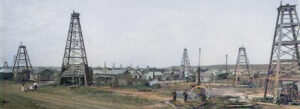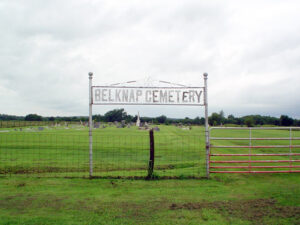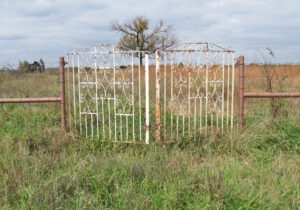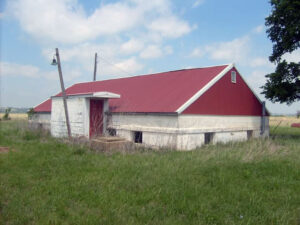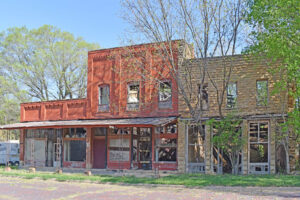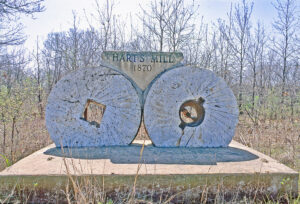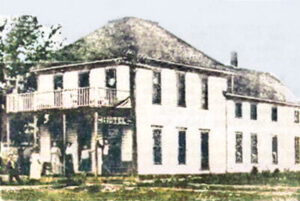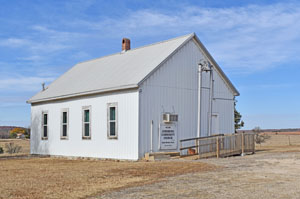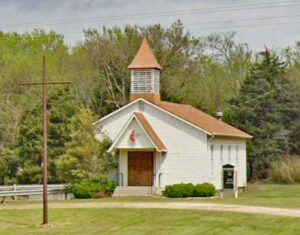| Town | Post Office Dates | Additional Information |
| Belknap | 1872-1878 |
A small settlement located on Middle Caney Creek in Centre Township in the northwestern part of Chautauqua County. This old town was about 17 miles northwest of Sedan, the county seat. There is an old church on the site, and the former Belknap & Boston school building now serves as a community center. There is also an old cemetery southeast of the church. |
| Boston | 1871-1879 |
Boston was organized in 1871 by seven Catholic bachelors from Osage Mission (St. Paul). Following the establishment of the town, several families from Osage Mission moved into the vicinity. It was located in Centre Township on the present Chautauqua-Elk County line. |
| Bradley | 1891-1894 | Bradley was located west of Elgin on the low river road to Hewins. The community once had a school. |
| Brownsville | 1883-1903 | Brownsville was a post office and trading post in Washington Township, very close to the Montgomery County line. In 1910, Brownsville was described as an inland hamlet near the eastern line of the county. The nearest railroad station was in Monett, on the Missouri Pacific Railroad, about five miles southwest. At that time, its population was 15. After its post office closed in 1903, it received its mail from Elk City in Montgomery County via rural route. The town was 11 miles northeast of Sedan, the county seat. |
| Cascade | 1882-1886 | Cascade was laid out around 1880 in the southern part of Little Caney Township. In the late 1870s or early 1880s, a colony of African American families moved into the vicinity, aided by the Kansas Freedmen’s Association. Reverend Alfred Fairfax acquired a 200-acre farm, brought in more black families, and began raising cotton. He also built a cotton gin in the vicinity. After the settlement, the town consisted of a hotel, two dry goods stores, a grocery store, a blacksmith shop, and a post office. The town site was chosen for its mineral water springs, so the town also had a bathhouse. The town of Cascade no longer exists. |
| Center | 1871-1894 1897-1907 |
Center, also spelled Centre, was established in 1870 and was located on the North Caney River, in the northern part of Chautauqua County, about ten miles north of Sedan, the county seat. In 1878, the population was 45. At that time, it had two physicians, the Anst and Hurt flour mill, the Centre grist mill, a general store, a wagon maker, a cooper, a grindstone factory, the Walters-Charles-Bro hotel, a public school, and Methodist and Baptist Churches. The nearest railroad station was Rogers on the Missouri Pacific, about seven miles south. The chief exports were livestock, wool, and wheat. When the town’s post office closed in 1907, it received its mail via rural route from Sedan. In 1910, Center had a population of 38. |
| Cloverdale | 1871-1905 |
Cloverdale was established in the early 1870s in Caneyville Township on the road between Grenola and Cedar Vale, near the western line of Chautauqua County. Located on Big Caney River, it was about 21 miles northwest of Sedan, the county seat, and about 12 miles south of Grenola in Elk County. In 1878, it had a water-powered gristmill, a district school, and a general store. Mail was delivered to D.A. McKee, the postmaster, triweekly. It also had a population of 20. The nearest railroad station was in Cedar Vale, about eight miles south, from which it exported grain and livestock. When the post office closed, the town received its mail by rural route from Grenola. A partially underground school is now used as a community center. |
| Colfax | 1872-1906 | Colfax was a mail-distributing hamlet in Salt Creek Township in the northeastern corner of the county and was a station on the Missouri Pacific Railroad. After its post office closed in 1906, mail to the area was delivered by rural route from Elk City, six miles away in Montgomery County. Its population in 1910 was 38. It was 15 miles northeast of Sedan, the county seat. Today, there are no remains of this site. |
| Elgin-New Elgin | 1871-1976 |
Elgin, Kansas, is a ghost town located in the fertile valley of the Big Caney River in Hendricks Township, Chautauqua County. It is also an extinct town as its post office was discontinued years ago. As of the 2020 census, its population was 60 |
| Farmersburg | 1872-1906 | Also spelled Farmerburgh, this was a small village on Salt Creek in northeastern Chautauqua County. It was established in 1870 on an old freight line connecting Independence and the little town of Boston. In 1878, it had a general store, a hotel, a wagonmaker, a druggist, and a population of about 40. Independence on the Leavenworth, Lawrence, and Galveston Railroad was its nearest shipping point, from which it exported grain and livestock. Mail was delivered four times per week to D.M. Woodworth, postmaster. After its post office closed in 1906, it received its mail by rural route from Longton in Elk County, about nine miles distant. At that time, the nearest railroad station was Hale, five miles east on the Missouri Pacific Railroad. It was about 11 miles from the county seat of Sedan. |
| Golden Gate | 1872-1876 | Golden Gate was in Belleville Township, about three miles east of Chautauqua. |
| Grafton | 1871-1906 | An inland hamlet located in Lafayette Township, Grafton was on North Caney Creek, six miles north of Sedan, the county seat. In 1870, a mill was built on the North Caney River. The Grafton post office was established in the general store in 1871. It had a population of 160 by 1878. At that time, it had a sawmill, two gristmills, a Methodist church, a district school, two physicians, three machinists, a drayman, a blacksmith, a general store, a druggist, a lawyer, and a saloon. Mail was delivered semi-weekly to James Hurt, the postmaster. It was 25 miles from Independence, the nearest railroad station, from which it shipped considerable wheat. It also had a stagecoach line to Elk Falls. After its post office closed in 1906, it received its mail by rural route from Sedan, which was also the nearest shipping and banking point. |
| Hale | 1882-1907 | Located in Salt Creek Township, Hale was named for the storekeeper, Alva Hale. He sold groceries, dry goods, and a variety of supplies. The post office, held in the general store, was established in 1882. The town later had other stores, a blacksmith shop, a livery stable, a hotel, a depot, and a stockyard, as it was located on the Missouri Pacific Railroad. Hale was located 12 miles northeast of Sedan, the county seat, and nine miles from Elk City, in Montgomery County, from which it was supplied with mail after its post office closed. The population was 45 in 1910. |
| Hart’s Mill | 1872-1887 |
Hart’s Mill was located in the southern central part of Chautauqua County. It was 12 miles southwest of Sedan, the county seat. The town included a post office, a blacksmith shop, a general store, a boarding house, and a gristmill. Mrs. Hart ran the boarding house where she served coffee, cornbread, and catfish three times a day. The big flood in 1885 washed away many of the buildings and houses. Most of the remaining stores and houses were then moved to Hewins. The post office moved to Hewins after it closed. The millstones were removed from the river in later years and are now mounted in cement at the town site. |
| Hewins | 1887-1966 |
Hewins was established in 1886, following the massive flood on the Caney River in the fall of 1885. A ghost town today, it is 15 miles southwest of Sedan, the county seat. There are just a few homes left in the area. |
| Jonesburg-Jonesburgh | 1877-1903 |
This place began in 1876 under the proprietorship of H.V. Jones, who erected the Jones House Hotel. It was located on Hickory Creek, in Belleville Township, in the southeastern part of Chautauqua County. Just three-quarters of a mile from the Oklahoma line, it was a trading point for many Indians from the Indian Territory. They traded ponies for groceries and other commodities. When a post office was established on November 21, 1877, it was called Jonesburgh. In 1878, it had a blacksmith, a wagonmaker, and a general store run by J.C. White. At that time, a stagecoach ran semi-weekly from Coffeyville in Montgomery County and delivered the mail four times a week to J.C. White, the postmaster. The general store was soon sold to Mr. McGuire. In the summer of 1880, J.T. Yates opened a general store. In 1882, Minner & Mayfield started a drugstore, and a man named Kidd opened another general store. On June 8, 1892, the town’s name was changed to Jonesburg. The town was ten miles from Sedan, the county seat, and 30 miles from Independence, the nearest railroad station. The Jonesburg Community Church still stands in the area. |
| Leeds-Squib | 1883-1927 | The town was first called Squib when a post office opened on May 14, 1883. Just a few months later, the name was changed to Leeds on August 6, 1883. Leeds had two or three stores, a drug store, a blacksmith shop, a barber shop, a church, a G.A.R. Lodge building, several houses and dugouts, and a livery barn. The school was called Ebenezer. The Leeds post office was discontinued on January 31, 1927. Leeds was about 22 miles northwest of Sedan, the county seat, and 12 miles from Grenola, on the Atchison, Topeka & Santa Fe Railroad. Grenola was also the nearest banking and shipping point. |
| Lisbon | 1872-1880 | Laid out in the spring of 1870, Lisbon was located on Big Caney River, in the southwestern part of Chautauqua County, 17 miles from Sedan, the county seat, and 50 miles from Independence, the nearest railroad station. In 1878, it had a saw and corn mill, shipped livestock, and had a population of 25. Semi-weekly mail was delivered to J.M. Brown, postmaster. It later had a hotel and a blacksmith shop. Lisbon was one mile west of the present site of Hewins. |
| Lone Elm | 1871 | The post office was open for only four months. |
| Lowe | 1871-1939 | A post-village in Caneyville Township of Chautauqua County, Lowe was on Middle Caney Creek, in the central part of Chautauqua County, eight miles from Sedan, the county seat, and 35 miles from Independence, on the Leavenworth, Lawrence, and Galveston Railroad, the nearest shipping point. In 1878, it had a carpenter and blacksmith, and a general store. At that time, it exported livestock and country produce, and its mail was delivered three times a week to F.C. Varner, the postmaster. By 1910, it was a station on the Missouri Pacific Railroad, with an express office, some local retail trade, and a population of 74. Sedan was its nearest banking point. |
| Matanzas-Jay Hawk | 1871-1887 | This place was started near the old ford of the Little Caney River in 1871. A petition was submitted to the Post Office Department requesting that a post office be established and named Matanzas. However, the petition was so poorly written that the authorities were unable to make out the desired name, so they wrote to D. Clark, the postmaster at Peru, asking him what it was. Clark, cognizant of a good joke, wrote back the name “Jay Hawk,” and accordingly, the office was established under that name on April 5, 1871. The people of the village and its vicinity were very perplexed by the joke played on them, and on September 1, 1871, the office’s name was changed to Matanzas. By the early 1880s, it had one business house, owned by J. Ross, a blacksmith shop, and a sawmill and gristmill. When the post office closed in 1887, it moved to Newport. |
| Metz | 1874-1888 | Metz was established in Washington Township in 1874. It was 14 miles west of Independence and south of Lone Cherry. |
| Minersview | 1879-1880 | Minersview was established in 1879. Its location is unknown, but a cemetery lies south and west of Peru, possibly near Minersview. |
| Monett | 1887-1918 | The post office moved from Mount Vernon when Monett was established. It was a station on the Missouri Pacific Railroad in Washington Township, ten miles northeast of Sedan, the county seat. It once had a general store which served as the post office, a school, a church, and a railroad depot. In 1910, it had telephone connections and a population of 12. On the site of Monett, on private property, is the old schoolhouse, as well as a private collection of old farm machinery and artifacts that were used in homes and on farms in the past. |
| Moore | 1901-1904 | Moore is believed to be on Moore Prairie, located north and west of Elgin. |
| Mount Vernon | 1872-1879 1882-1887 |
Mount Vernon was established in Washington Township in 1872. The post office moved to Monett after it closed. |
| Ozro-Ozro Falls | 1870-1872 1888-1892 |
A group of Norwegian mechanics who had organized in Chicago, Illinois, located at Ozro Falls on the Big Caney River in April 1869. The first Law and Order League was organized in 1870 to stop claim jumping, which was then practiced around Hell’s Bend and Ozro Falls. Several merchants opened stores, and it boded well to outgrow Cedar Vale. However, in the early 1880s, the Atchison, Topeka, and Santa Fe Railroad bypassed Ozro, and some merchants moved to Cedar Vale. |
| Rogers | 1887-1905 | A station on the Missouri Pacific Railroad in Summit Township of Chautauqua County, Rogers was located six miles west of Sedan, the county seat. It once had a school, shipping pens at the railroad site, and a post office. After its post office closed, Rogers received its mail from Sedan by rural route. |
| Ross City | 1873-1875 | Ross City was in Sedan Township. It had a school, but it was short-lived, as the town was relocated to Sedan in 1875. |
| Saint Paul | 1870-1874 | This place was founded by Martin Knuckols in Little Caney Township in 1869. It was started when it was thought that it would fall upon the line of the Leavenworth, Lawrence & Gulf Railroad when it was built. Knuckols threw himself into the project, hoping to make a fine speculation. He erected a large hotel for about $3,000 and was pushing other improvements as rapidly as possible. But the railroad failed to connect as Knuckols had anticipated, and in going in another direction, Knuckols and his town were left high and dry. The hotel later burned down, and the town became defunct. The cemetery at St. Paul remains in Montgomery County. |
| Spring Creek | 1872-1907 | One of the oldest settlements in Chautauqua County, this was a country trading point on Middle Caney Creek in Centre Township. At one point, it had a steam mill, a good store, a post office, a tannery, and a blacksmith shop. It was located seven miles northwest of Sedan, the county seat, from which it received daily mail by rural route, after its post office closed. It was about three miles north of Rogers, the nearest railroad station. The population in 1910 was 20. |
| Sycamore | 1871-1876 | |
|
Wauneta-Fulda |
1872-1961 |
The first post office was established in 1872 in the southwestern part of the county. The mail was first brought to Fulda by horse and buckboard. The town’s name changed from Fulda to Wauneta on April 2, 1883. The railroad was built in 1886, and the mail was then brought by train. Among the early businesses were a general store, a drug store, and a blacksmith shop. Later, it also had a grocery store, a gas station, and an auto repair shop. Today, the Wauneta Methodist Church still stands at Hwy 166 and Rd 9, about ten miles west of Sedan. |
| Wilhite | 1884-1885 | When the post office was established, Charles J. Wilhite was the first post master. |
©Kathy Alexander/Legends of Kansas, updated January 2026.
Also See:
Chautauqua County Photo Gallery
Sources:
1878 Gazetteer and Business Directory, R. L. Polk & Co.
Blackmar, Frank W.; Kansas: A Cyclopedia of State History, Vol I; Standard Publishing Company, Chicago, IL 1912.
Cutler, William G.; History of Kansas; A. T. Andreas, Chicago, IL, 1883.
Genealogy Trails

